冀教版七年级下册Lesson13 课件.ppt
合集下载
七下 Unit 3 Lesson 13 课件 冀教版(PPT16张)
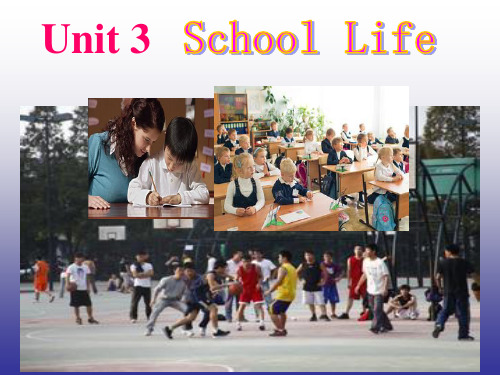
hool going?
life n. 生活 start v.开始;出发 twice adv. 两次;两倍 yeah int. 是;对 shop n. 手工艺课
term n.学期 finish v.完成;结束 win v.赢得;获胜 social adj. 社会的 myself pron. 我自己
—A small bird house.
15. —_W__h_e_n_ does your first class begin in the
morning? —At eight o’clock.
Homework
Write sown your class timetable. Then use it to make up a dialogue.
2.Read the lesson and answer the questions.
1. How is Jenny’s school life going?
She’s a little busy this term.
2. How many classes does Wang Mei have every day?
5. A: How is your school __l_if_e________ going? B: Well, it’s a little busy.
Exercises! I. 根据句意和所给的首字母提示填空。
1. We have two school te_r_m__s__ every year. 2. The meeting st_a_r_te_d__, but Li Ming didn’t come. 3. Play well together and you will w__i_n___ the
life n. 生活 start v.开始;出发 twice adv. 两次;两倍 yeah int. 是;对 shop n. 手工艺课
term n.学期 finish v.完成;结束 win v.赢得;获胜 social adj. 社会的 myself pron. 我自己
—A small bird house.
15. —_W__h_e_n_ does your first class begin in the
morning? —At eight o’clock.
Homework
Write sown your class timetable. Then use it to make up a dialogue.
2.Read the lesson and answer the questions.
1. How is Jenny’s school life going?
She’s a little busy this term.
2. How many classes does Wang Mei have every day?
5. A: How is your school __l_if_e________ going? B: Well, it’s a little busy.
Exercises! I. 根据句意和所给的首字母提示填空。
1. We have two school te_r_m__s__ every year. 2. The meeting st_a_r_te_d__, but Li Ming didn’t come. 3. Play well together and you will w__i_n___ the
冀教版初中英语七年级下册Unit 3 Lesson 13PPT课件
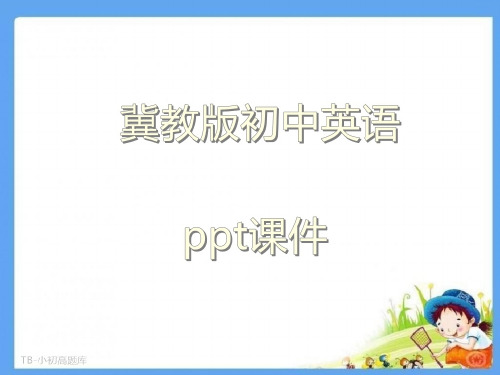
Who won the race? 谁在赛跑中获胜了?
We beat their team by 10 points. 我们赢 了他们队10分。
【探究总结】win, beat的用法
【图解助记】
beat sb. (in the match) win the match
(比赛中)赢了某人
赢了比赛
Exercises
Do you often _ta__k_e_ _p__a_r_t ___i_n_ the
sports meet? 2. 李明在跳远中得了第一。
Li Ming _w__o_n__ _f_ir_s_t__ _p_l_a_c_e in the long
j3u.Xm你pi要.’a独n立—完成th作e业。Walled City
for his health. 林涛擅长跑步,那对他的 健康有益处。
The teacher is goodቤተ መጻሕፍቲ ባይዱto his students and he is good with his students.
这个老师对他的学生很好,并且他和学 生们相处得很好。
【探究总结】be good at, be good with, be good to, be good for的辨析
A. at for
B. on C. in D.
3. He jumped seven meters. He won first place
in the __C___.
A. high jump
B. jump high
C. long jump
D. jump long
4. My sister wants to be an actress __C___ the
We beat their team by 10 points. 我们赢 了他们队10分。
【探究总结】win, beat的用法
【图解助记】
beat sb. (in the match) win the match
(比赛中)赢了某人
赢了比赛
Exercises
Do you often _ta__k_e_ _p__a_r_t ___i_n_ the
sports meet? 2. 李明在跳远中得了第一。
Li Ming _w__o_n__ _f_ir_s_t__ _p_l_a_c_e in the long
j3u.Xm你pi要.’a独n立—完成th作e业。Walled City
for his health. 林涛擅长跑步,那对他的 健康有益处。
The teacher is goodቤተ መጻሕፍቲ ባይዱto his students and he is good with his students.
这个老师对他的学生很好,并且他和学 生们相处得很好。
【探究总结】be good at, be good with, be good to, be good for的辨析
A. at for
B. on C. in D.
3. He jumped seven meters. He won first place
in the __C___.
A. high jump
B. jump high
C. long jump
D. jump long
4. My sister wants to be an actress __C___ the
英语:Unit-2-《On-the-Train》lesson13课件(1)(冀教版七年级下)
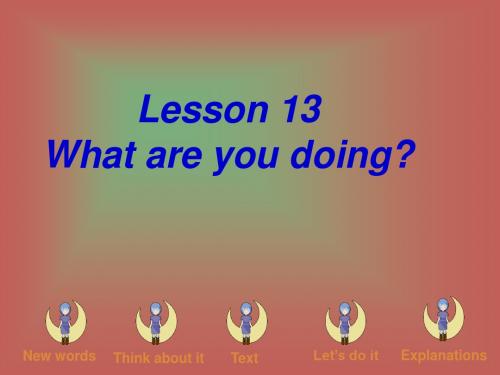
No. I’m playing with a baby. 不,我正在和 一个孩子玩。 play with sb. /sth. 和某人/某物玩。例如: Don’t play with fire. 别玩火。 Jim is playing with his sister. 吉姆正和他 的妹妹玩。
He is laughing. 他正在笑。 laugh 是动词 “笑(出声)”;后接 at, 意为 “嘲笑;因……而笑”。例如: His joke made the children laugh. 他的笑话使孩 子们笑了。 He laughs best who laughs last. 谁笑在最后,谁 笑得最甜。 Don’t laugh at him. 别嘲笑他。 辨析:laugh 与 smile laugh 指一般的 “发笑” 或 “出声大笑”,它 意味着不但有面部表情,而且还有动作和声音, 多指快乐、高兴;也可以指嘲笑(后接 at)。 smile 指“笑” “微笑”,怀着好意、善意。
You two are quiet. 你们两个很安静。 quiet 是形容词 “安静的;寂静的”;反义 词:noisy “嘈杂的”。例如: She is a quiet girl. 她是个安静的女孩。 a quiet evening 宁静的夜晚 a quiet street 僻静的街道
We are playing a word game. 我们正在做一个单词游戏。 play 的用法: 动词 “玩;装扮;演奏;演出;打(球);踢(球)”。例如: 玩;装扮。例如: Children like to play. 孩子们爱玩。 Li Lei and his friends like to play in the wood house.李雷和他 的朋友们喜欢在木房子里玩。 演(弹,吹)奏。例如: I like playing the violin. 我喜欢拉小提琴。 3)表演;上演;上映。例如: What’s playing at the theatre? 剧场里在表演什么节目? 4)打(玩,踢)球。例如: The boys are playing football on the playground. 孩子们正在 操场上踢足球。
冀教版七年级英语下册教学课件:Lesson 13(共25张PPT)
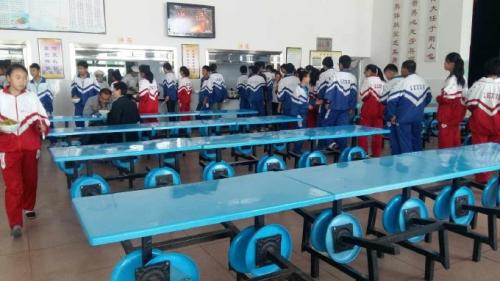
点拨2 对频率副词提问用how often.
Quiz.
1. Yao Ming is good at ________(play) basketball. 2. I start school at 8:00 a.m. ____ ____ ____ you start school? 3. We have a big sports meet twice a week. _____ ____ we have a big sports meet? 4. I ____ have six classes every day. A. too B. alao C. either. 5. My school subjects are so _________(interest). 6. Last term I______ (win) first place. 7. Last week, I made a bird house all by ____(I).
Yao Ming is good at _______(play) basketball.
Zhang Jie is good at ________(sing)
Liu Xiang is good at ________(run)
点拨1 be good at sth.善长于某事 be good at doing sth.善长于做某事
By learning this lesson, I can: 1. read and write the new words. 2. use the new phrases 3. write about my school life.
New words
term /tɜ:m/
start /sta:t/
冀教版七年级下册英语课件:Unit 3 Lesson 13 How Is School Going (共23页)
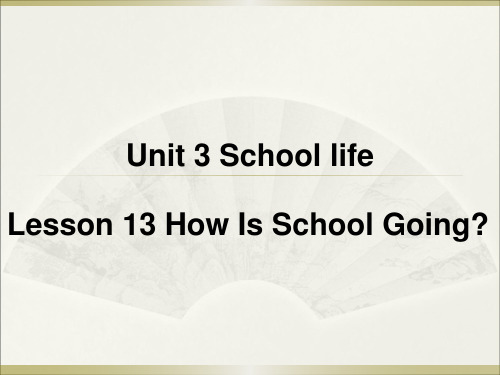
Unit 3 School life
Lesson 13 How Is School Going?
How is … going?
How is it going? How is your business going? How is your work going? Answer: Great! Pretty good! Everything goes well! Not bad. Just so so! Everything is OK! Terrible! =How is your school life?
让我们今天下午去购物。
start
She started cleaning the kitchen .= She started to clean the kitchen. The trees start to turn green. He saved some money to start a new life. He started the car and hurried off. He started a new shop last year.
你经常在哪儿购物?
2.My favourite subject is shop in my school.
在学校我最喜欢的科目是手工艺课。
3.They are chatting outside the shop.
他们正在商店外面闲聊。
4.Let's go shopping this afternoon.
Let's Do It! 1.Listen and write down what subjects they have.
Chinese maths socials studies history P.E. English shop French art
Lesson 13 How Is School Going?
How is … going?
How is it going? How is your business going? How is your work going? Answer: Great! Pretty good! Everything goes well! Not bad. Just so so! Everything is OK! Terrible! =How is your school life?
让我们今天下午去购物。
start
She started cleaning the kitchen .= She started to clean the kitchen. The trees start to turn green. He saved some money to start a new life. He started the car and hurried off. He started a new shop last year.
你经常在哪儿购物?
2.My favourite subject is shop in my school.
在学校我最喜欢的科目是手工艺课。
3.They are chatting outside the shop.
他们正在商店外面闲聊。
4.Let's go shopping this afternoon.
Let's Do It! 1.Listen and write down what subjects they have.
Chinese maths socials studies history P.E. English shop French art
冀教版英语七年级下册 Unit 3 Lesson 13《How Is School Going》(共37张PPT)
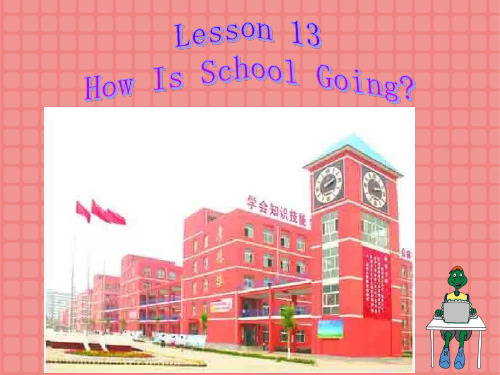
2. My little brother didn’t go to bed B his homework until he finished ___ last night. A. do B. doing C. to do finish ( doing ) sth
--- Do you often go fishing with your father? --- No, ___ A . I don’t like fishing at all. A. never B. often C. usually D. sometimes
I start class at 8:00.
I have P.E. lesson twice a week.
I finish school at 5:00.
I do many activities after school.
play football
play tennis
play ping-pong play table tennis
A --- ____ can we become good
learners? --- By working hard and asking the teachers for help. A. How B. Where C. When
How is your school life going?
How is … going? 意思是“……怎么样?” 用来询问对方最近学习、工作、生活等 状况。 How is your business going? 你的生意怎么样? How is your job going? 你的工作怎么样?
C • --- Hey, Jane, ____ are you feeling now? • ---- Much better. Thanks. • A. What B. Where C. How D. When
冀教初中英语七下《Lesson 13 How Is School Going》PPT课件 (2)
▪ lifen. 生活
▪ termn.学期
▪ winv.赢得;获胜
▪ startv.开始;出发
▪ yeahint. 是;对
▪ finishv.完成;结束 ▪ socialadj. 社会的
▪ twiceadv. 两次;两倍 ▪ shopn. 手工艺课
▪ myselfpron. 我自己
Listening
Exercises!
I. 根据句意和所给的首字母提示填空。
1. Wehavetwoschoolt___e_r_m_severyyear. 2. Themeetings__ta_r_t_e_d, butLiMingdidn’tcome. 3. Playwelltogetherandyouwillw____i_n_thegame. 4. I’mnotachildnow.
3. Ioften___ta_k_e_p_a_r_t_i_n_thelongjumpatthesportsmeet.
4. A:What____________doyouhave?
5. B:IhaveChinseusbej,eEctnsglish, mathandsomeothers.
6. 5. A:Howisyourschool____________going?
7. B:Well, it’salittlebusy. life
4 Workinpairs.
• Example:
• A:Whatsubjectsdoyouhave? • B:… • A:Howmanyclassesdoyouhaveeveryday? • B:… • A:Whendoesthefirst/second/…classstart? • B:…
lifefinishsubjecttakepartinbegoodat
冀教版英语七年级下册 Unit 3 Lesson 13《How Is School Going》 (共22张PPT)
Fast Quiz
根据句意 , 用所给单词的适当形式填空。 playing 1.Yao Ming is good at ________(play) basketball. 2.My school subjects are so _______ interesting (interest). myself 3.I can do the work by _______(I).
She is a little busy this term.
Group Work
Discuss in groups , and try to find out the language points from the text ,then explain them. 1.You are good at the long jump.
They are doing exercises.
They are having an English class.
They are playing basketball .
School Life
Learning Aims
1. 会读会背以下单词: life , term , start , finish , twice, win , social , myself
2.We always have a big sports meet twice a year.
探究一:重点句型: You are good at the long jump. 思考: 你擅长跳远 翻译句子。______________________ 。
擅长某事 , be good at sth.意为 __________
探究二:重点句型: We always have a sports meet twice a year.
冀教版七年级英语下册Lesson13HowIsSchoolGoing优质PPT课件
Unit 3 School Life Lesson 13
Ⅰ. 短语连线 1. a little busy 2. social studies 3. take part in 4. school life 5. be good at 6. by oneself
A. 独自地,单独 B. 擅长 C. 有点儿忙 D. 参加 E. 社会科学 F. 学校生活
1. How is your school life going? 你的学校生活怎么样? 【自主领悟】how在此处用作疑问副词,与going连用,意为 “……怎么样?/……如何?/……还好吗?”。例如:How is everything going? 一切都还好吗?
【归纳拓展】疑问词how的用法
【活学活用】 Some people ________ swimming. Because they think swimming ________ their health. A. are good at; is good for B. are good for; is good with C. are good to; is good for D. are good with; is good for
1. I start school at 8: 00 a. m. I usually finish at 5: 00 p. m. 我上午8:00开始上课。通常下午5:00结束。 【 自 主 领 悟 】finish 用 作 不 及 物 动 词 , 可 以 单 独 使 用 , 意 为 “完成;结束”, 第三人称单数形式为finishes。 例如:The movie finishes at 5: 00 p. m. 电影下午五点钟结束。
Ⅱ. 句型展示 1. 你的学校生活怎么样? ________ ________ your school life ________ ? 2. 上学期我获得了第一。 Last term I ________ ________ ________ . 3. 上周,我独自制作了一个鸟舍。 ________ ________ , I made a bird house ________ ________ ________ . 答案:1. How is; going 2. won first place 3. Last week;all by myself
Ⅰ. 短语连线 1. a little busy 2. social studies 3. take part in 4. school life 5. be good at 6. by oneself
A. 独自地,单独 B. 擅长 C. 有点儿忙 D. 参加 E. 社会科学 F. 学校生活
1. How is your school life going? 你的学校生活怎么样? 【自主领悟】how在此处用作疑问副词,与going连用,意为 “……怎么样?/……如何?/……还好吗?”。例如:How is everything going? 一切都还好吗?
【归纳拓展】疑问词how的用法
【活学活用】 Some people ________ swimming. Because they think swimming ________ their health. A. are good at; is good for B. are good for; is good with C. are good to; is good for D. are good with; is good for
1. I start school at 8: 00 a. m. I usually finish at 5: 00 p. m. 我上午8:00开始上课。通常下午5:00结束。 【 自 主 领 悟 】finish 用 作 不 及 物 动 词 , 可 以 单 独 使 用 , 意 为 “完成;结束”, 第三人称单数形式为finishes。 例如:The movie finishes at 5: 00 p. m. 电影下午五点钟结束。
Ⅱ. 句型展示 1. 你的学校生活怎么样? ________ ________ your school life ________ ? 2. 上学期我获得了第一。 Last term I ________ ________ ________ . 3. 上周,我独自制作了一个鸟舍。 ________ ________ , I made a bird house ________ ________ ________ . 答案:1. How is; going 2. won first place 3. Last week;all by myself
冀教版七年级英语下册Unit 3 School Life Lesson 13 课件(共15张PPT)
3. 上学期我获得了第一名。
Last term I ______ won ______ first ______. place 4. 我自己建了一所大房子。 I made a big house all ______ by myself ______ ______.
Fill in the blanks with the words in the boxes
Ⅰ. 短语连线
1. 运动会
2. 参加 3. 擅长 4. 赢得第一名
A. win first place
B. sports meet C. take part in D. be good at
Read the text and find these phrases
1.
….怎么样? ____ 2.完成做某事____ 3.忙于做某事____ 4.每天____ 5.多少节课____ 6.社会科学____ 7.举行运动会____ 8.一周一次____ 9.擅长干某事____ 10.独自,单独____ 11.跳远____ 12.参加____
Read and answer.(分小组快速读课文回答问题
1. How is Jenny’s school life going? She is a little busy this term. She has six classes every day. Her school days are very long. 2. How many classes does Wang Mei have every day? She also has six classes every day.
Read and list.(认真仔细地读课文,然后回
- 1、下载文档前请自行甄别文档内容的完整性,平台不提供额外的编辑、内容补充、找答案等附加服务。
- 2、"仅部分预览"的文档,不可在线预览部分如存在完整性等问题,可反馈申请退款(可完整预览的文档不适用该条件!)。
- 3、如文档侵犯您的权益,请联系客服反馈,我们会尽快为您处理(人工客服工作时间:9:00-18:30)。
【解析】 quiet 是形容词 “安静的;寂静的”; 反义词:noisy “嘈杂的”。
e.g. She is a quiet girl. 她是个安静的女孩。 a quiet evening 宁静的夜晚 a quiet street 僻静的街道
We are playing a word game. 我们正在做一个单词游戏。
• L: Where is Wu Li, Danny? • D: I don’t know. I can’t see her. Maybe she is
going to the washroom. • J: Wu Li is here. She is sitting beside me. • L: You two are quiet. What are you doing? • J: We’re playing a word game. You’re quiet,
Language points
What is your fvourite game? 你最喜欢的游戏是什么?
【解析】 favourite :形容词 “特别喜爱的”。
e.g. My favourite colour is red. 我最喜欢的颜色是红色。 My favourite subject is English. 我最喜欢的科目是英语。
【解析】 可作名词 “特别喜爱的人或物”。
e.g. Bananas are my favourite. 香蕉是我的最爱。
What is the baby doing? 那个婴儿正在干什么?
【解析】 be (am, is, are)+现在分词构成现在 进行时,当主语是第一人称 (I) 时用 am,主语 是第三人称单数(he/she/it)时用 is,主语是 第二人称及复数人称时用 are。
New Words
• maybe adv. 可能 • washroom n. 洗手间 • quiet adj. 安静的 • word n. 词;字 • game n. 游戏 • newspaper n. 报纸 • join v. 加入 • baby n. 婴儿 • use v. & n. 使用 • kootchie koo 哄婴儿语 • goo ga 婴儿语
too. What are you doing? • L: I am reading the newspaper. But can I join
you?
• J: Sure! Do you want to join the game, too, Danny?
• D: No. I’m playing with a baby! I like to play with babies. He is laughing.
Think about it
• What is your favorite game? Why? • Do you like babies? Why or why not?
Listening
Listen and answer
What is the baby doing? What is Danny doing? What are Wu Li and Jenny doing?
Exercises!
I. 用所给词的适当形式填空。
1. Do you like __b_a_b_ie_s__ (baby)? 2. What about ___g_o_in__g_ (go) out for a walk? 3. I want some ___m_e_a_t__ (meat). 4. He is __s_it_ti_n_g__ (sit) in the sofa. 5. Danny, don’t talk behind ____h_e_r__ (she).
【解析】 laugh 是动词 “笑(出声)”;后接 at, 意为 “嘲笑;因……而笑”。
e.g. His joke made the children laugh.
他的笑话使孩子们笑了。
D /smile
laugh 指一般的 “发笑” 或 “出声大笑” ,它意味着不但有面部表情,而且还有 动作和声音,多指快乐、高兴;也可以 指嘲笑(后接 at)。smile 指“笑” “微 笑”,怀着好意、善意。
e.g. I am making a kite. 我正在做风筝。 The girl is watching the basketball match. 这个女孩正在看篮球比赛。
They are planting trees over there. 他们正在那植树。
You two are quiet. 你们两个很安静。
3. I would like some milk. (改为一般疑问句). _W__o_u_l_d__ you __l_ik__e___ _s__o_m_e___ milk?
4. What would you like to drink? (改为同义句) What ___d_o____ you __w_a_n__t__ to drink?
5. We feel sick. (对划线部分提问) __H__o_w___ __d_o_____ you __f_e_e_l___?
Homework
Play a word game of crossword. in a small group. Cut some pieces of paper into 2cm squares. On each piece of paper, write a letter of the alphabet. Then use the squares to make English words.
【解析】 play 的用法:1)玩,
e.g. Children like to play. 孩子们爱玩。 Li Lei and his friends like to play in the wood house.李雷和他的朋友们喜欢在木房子里玩。
【解析】 play :2)演(弹,吹)奏。 e.g. I like playing the violin. 我喜欢拉小提琴。
【解析】 play :3)表演;上演;上映。 e.g. What’s playing at the theatre?
剧场里在表演什么节目? 【解析】 play :4)打(玩,踢)球。
e.g. The boys are playing football on the playground. 孩子们正在操场上踢足球。
No. I’m playing with a baby. 不,我正在和一个孩子玩。
【解析】 play with sb. /sth. 和某人/某物玩。
e.g. Don’t play with fire. 别玩火。 Jim is playing with his sister. 吉姆正和他的妹妹玩。
He is laughing. 他正在笑。
e.g. He has some Chinese paintings. 他有一些中国画。
Some like sports, others like music. 一些人喜欢运动,另外一些人喜欢音乐。 【注意】 some 在句中可作状语,此时 为副词 “大约” 的意思,相当于 about。
e.g. There are some 3000 workers in the factory. 在那个工厂约有3000工人。
I hope he doesn’t need to use the washroom! 我希望他不需要用洗手间。
【解析】 need 动词 “需要”。
e.g. He needs some help. 他需要帮助。 He needs to see you. 他需要见你。 The computer needs repairing. 电脑需要修了。
A. something eat B. eat something
C. to something D. something to eat
3. ________ he is in the washroom.
A. May be
B. Maybe
C. Sure
D. Must
4. He ________ his left hand to write.
【注意】 need to do sth. 须用人作主语
e.g. Cut some pieces of paper into 2cm squares. 把几张纸剪成2厘米的正方形。
Cut some pieces of paper into 2cm squares. 把几张纸剪成2厘米的正方形。
【解析】 some “一些”,一般用于肯定句, 而 any 多用于疑问、否定或条件句。
• D:I hope he doesn’t need to use the washroom!
• J: Danny! • D: Sorry!
Kootchie kootchie koo!
Goo goo ga ga!
Let’s do it
• Play a word game in a small group. Cut some pieces of paper into 2cm squares. Try to make about 100 squares. On each piece of paper, write a letter of the alphabet. Then use the squares to make English words. Join the words together like a crossword.
冀教七年级版 (下)
Lesson 13 What Are You Doing?
Learning Aims
1.掌握重点词汇: wait, drink, fruit, grape, thirsty, bottle 2. 学会使用句型:What would you like? I would like…
e.g. She is a quiet girl. 她是个安静的女孩。 a quiet evening 宁静的夜晚 a quiet street 僻静的街道
We are playing a word game. 我们正在做一个单词游戏。
• L: Where is Wu Li, Danny? • D: I don’t know. I can’t see her. Maybe she is
going to the washroom. • J: Wu Li is here. She is sitting beside me. • L: You two are quiet. What are you doing? • J: We’re playing a word game. You’re quiet,
Language points
What is your fvourite game? 你最喜欢的游戏是什么?
【解析】 favourite :形容词 “特别喜爱的”。
e.g. My favourite colour is red. 我最喜欢的颜色是红色。 My favourite subject is English. 我最喜欢的科目是英语。
【解析】 可作名词 “特别喜爱的人或物”。
e.g. Bananas are my favourite. 香蕉是我的最爱。
What is the baby doing? 那个婴儿正在干什么?
【解析】 be (am, is, are)+现在分词构成现在 进行时,当主语是第一人称 (I) 时用 am,主语 是第三人称单数(he/she/it)时用 is,主语是 第二人称及复数人称时用 are。
New Words
• maybe adv. 可能 • washroom n. 洗手间 • quiet adj. 安静的 • word n. 词;字 • game n. 游戏 • newspaper n. 报纸 • join v. 加入 • baby n. 婴儿 • use v. & n. 使用 • kootchie koo 哄婴儿语 • goo ga 婴儿语
too. What are you doing? • L: I am reading the newspaper. But can I join
you?
• J: Sure! Do you want to join the game, too, Danny?
• D: No. I’m playing with a baby! I like to play with babies. He is laughing.
Think about it
• What is your favorite game? Why? • Do you like babies? Why or why not?
Listening
Listen and answer
What is the baby doing? What is Danny doing? What are Wu Li and Jenny doing?
Exercises!
I. 用所给词的适当形式填空。
1. Do you like __b_a_b_ie_s__ (baby)? 2. What about ___g_o_in__g_ (go) out for a walk? 3. I want some ___m_e_a_t__ (meat). 4. He is __s_it_ti_n_g__ (sit) in the sofa. 5. Danny, don’t talk behind ____h_e_r__ (she).
【解析】 laugh 是动词 “笑(出声)”;后接 at, 意为 “嘲笑;因……而笑”。
e.g. His joke made the children laugh.
他的笑话使孩子们笑了。
D /smile
laugh 指一般的 “发笑” 或 “出声大笑” ,它意味着不但有面部表情,而且还有 动作和声音,多指快乐、高兴;也可以 指嘲笑(后接 at)。smile 指“笑” “微 笑”,怀着好意、善意。
e.g. I am making a kite. 我正在做风筝。 The girl is watching the basketball match. 这个女孩正在看篮球比赛。
They are planting trees over there. 他们正在那植树。
You two are quiet. 你们两个很安静。
3. I would like some milk. (改为一般疑问句). _W__o_u_l_d__ you __l_ik__e___ _s__o_m_e___ milk?
4. What would you like to drink? (改为同义句) What ___d_o____ you __w_a_n__t__ to drink?
5. We feel sick. (对划线部分提问) __H__o_w___ __d_o_____ you __f_e_e_l___?
Homework
Play a word game of crossword. in a small group. Cut some pieces of paper into 2cm squares. On each piece of paper, write a letter of the alphabet. Then use the squares to make English words.
【解析】 play 的用法:1)玩,
e.g. Children like to play. 孩子们爱玩。 Li Lei and his friends like to play in the wood house.李雷和他的朋友们喜欢在木房子里玩。
【解析】 play :2)演(弹,吹)奏。 e.g. I like playing the violin. 我喜欢拉小提琴。
【解析】 play :3)表演;上演;上映。 e.g. What’s playing at the theatre?
剧场里在表演什么节目? 【解析】 play :4)打(玩,踢)球。
e.g. The boys are playing football on the playground. 孩子们正在操场上踢足球。
No. I’m playing with a baby. 不,我正在和一个孩子玩。
【解析】 play with sb. /sth. 和某人/某物玩。
e.g. Don’t play with fire. 别玩火。 Jim is playing with his sister. 吉姆正和他的妹妹玩。
He is laughing. 他正在笑。
e.g. He has some Chinese paintings. 他有一些中国画。
Some like sports, others like music. 一些人喜欢运动,另外一些人喜欢音乐。 【注意】 some 在句中可作状语,此时 为副词 “大约” 的意思,相当于 about。
e.g. There are some 3000 workers in the factory. 在那个工厂约有3000工人。
I hope he doesn’t need to use the washroom! 我希望他不需要用洗手间。
【解析】 need 动词 “需要”。
e.g. He needs some help. 他需要帮助。 He needs to see you. 他需要见你。 The computer needs repairing. 电脑需要修了。
A. something eat B. eat something
C. to something D. something to eat
3. ________ he is in the washroom.
A. May be
B. Maybe
C. Sure
D. Must
4. He ________ his left hand to write.
【注意】 need to do sth. 须用人作主语
e.g. Cut some pieces of paper into 2cm squares. 把几张纸剪成2厘米的正方形。
Cut some pieces of paper into 2cm squares. 把几张纸剪成2厘米的正方形。
【解析】 some “一些”,一般用于肯定句, 而 any 多用于疑问、否定或条件句。
• D:I hope he doesn’t need to use the washroom!
• J: Danny! • D: Sorry!
Kootchie kootchie koo!
Goo goo ga ga!
Let’s do it
• Play a word game in a small group. Cut some pieces of paper into 2cm squares. Try to make about 100 squares. On each piece of paper, write a letter of the alphabet. Then use the squares to make English words. Join the words together like a crossword.
冀教七年级版 (下)
Lesson 13 What Are You Doing?
Learning Aims
1.掌握重点词汇: wait, drink, fruit, grape, thirsty, bottle 2. 学会使用句型:What would you like? I would like…
